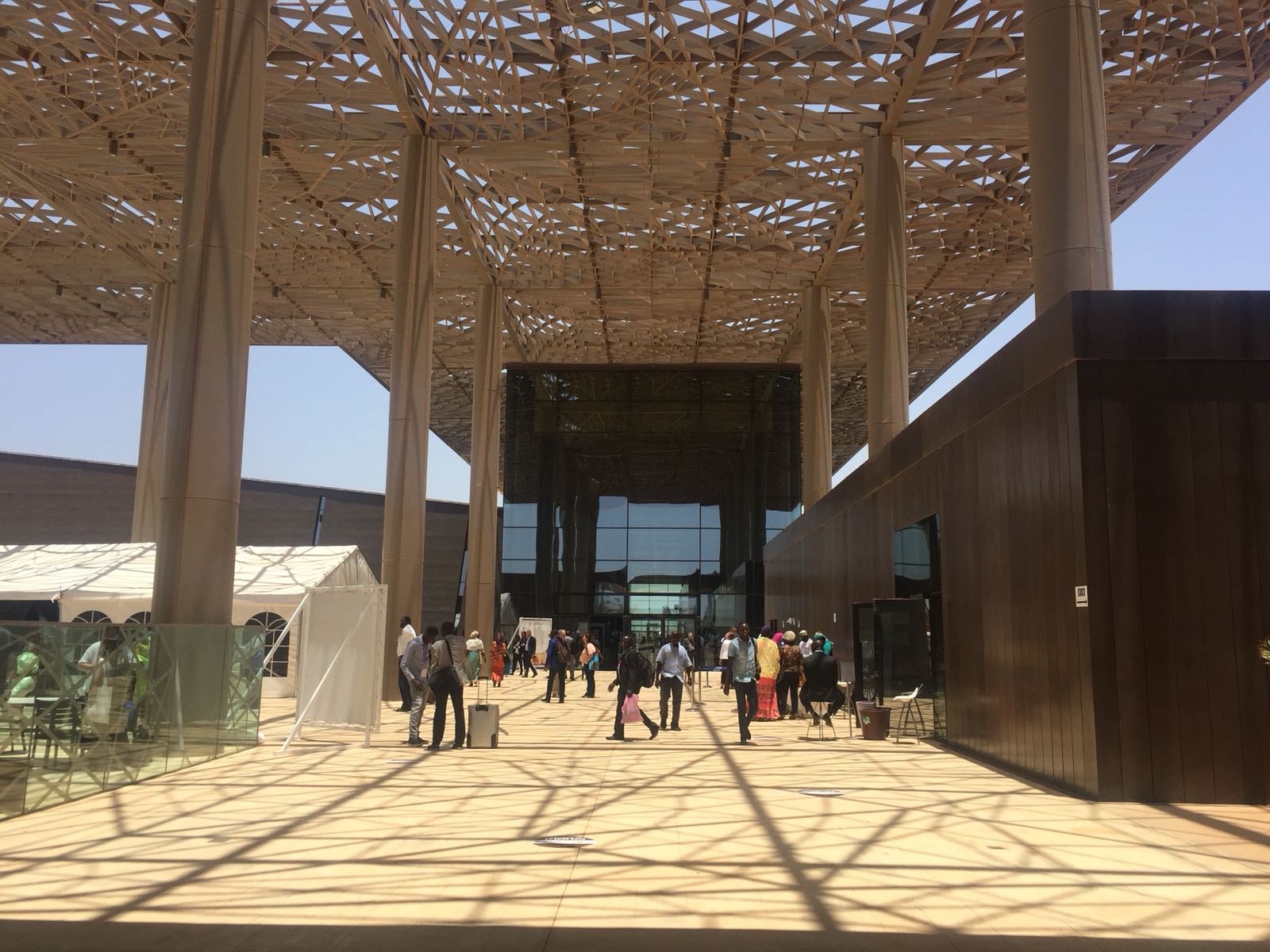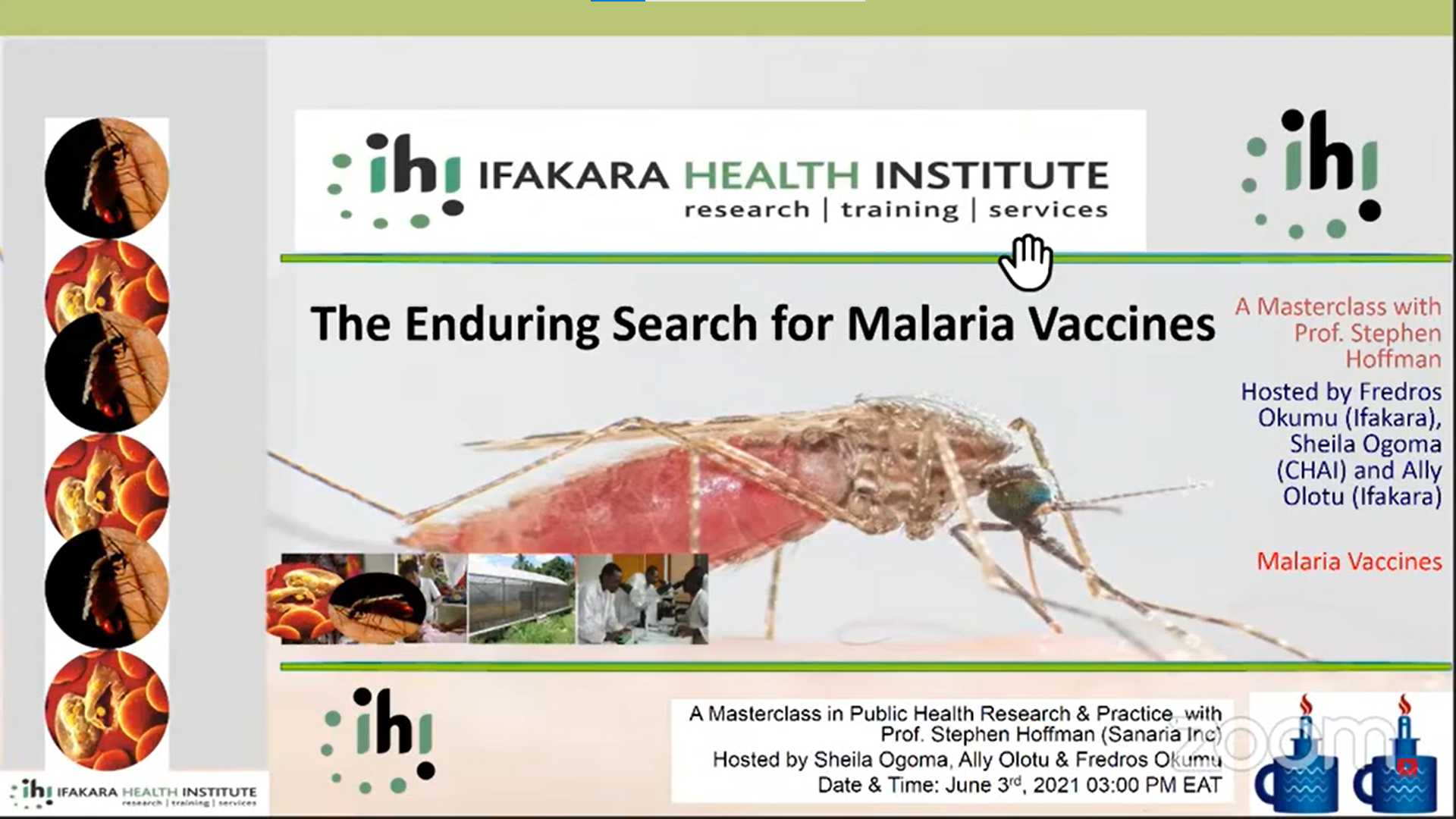7th Multilateral Initiative on Malaria (MIM) Pan African Conference – 2018: Day 4
Thursday, 19th April 2018
Published: 05/12/2018
This report is brought to you by the MESA Correspondents Shehu Shagari Awandu, Manuela Runge, Helena Martí Soler, and Camila Damasceno. Senior editorial support has been facilitated by Ingeborg van Schayk.
THEMES: THEMES: Basic Science | Drug-based Strategies | Epidemiology | Health Systems | Vaccines
MESA Correspondents bring you cutting-edge coverage from the 7th Multilateral Initiative on Malaria (MIM) Pan African Malaria Conference
Day 4: Thursday, April 19th
Plenary Session:
The plenary session was chaired by Prof. Ogabara Doumbo of MRTC, Mali who introduced the speakers.
“From parasite biology to T cells to African infants to genome editing and back: toward licensure of the first and future generations of live parasite Plasmodium falciparum sporozoite (PfSPZ) vaccines”
A fully compliant vaccine product with clinical safety, tolerability and efficacy is needed for licensure according to Dr. Stephen L. Hoffman of Sanaria. The Plasmodium falciparum sporozoite (PfSPZ) vaccine is aiming to be the first human infectious disease vaccine. Delivering the first plenary talk focusing on the protection offered by the PfSPZ vaccine across multiple clinical trial sites, Dr. Hoffman reflected on the journey of the vaccine development while offering insights from the past and future plans. The aseptic, purified, vialed cryopreserved PfSPZ Vaccine protects through T cell responses that recognize both homologous and the heterologous strains of P. falciparum. The PfSPZ vaccines are distributed internationally in liquid nitrogen vapor phase and administered by direct venous inoculation, which have key advantages over traditional cold chains and methods of administration. More than 1,800 subjects have received >5,000 injections of PfSPZ-based products in >30 clinical trials in the U.S, Europe and Africa, with a trial in Indonesia planned for 2018. Dr. Hoffman highlighted that from these clinical trials, promising results and protection have been observed with the goal of demonstrating that the PfSPZ Vaccine can be used to eliminate malaria in geographically defined areas where transmission has been reduced by other control measures.
Highlighting the roles played by MIM on the developmental journey of the promising PfSPZ Vaccine, Dr. Hoffman remarked that the vaccine was a product of the first MIM conference with several African scientists now playing key roles in the vaccine trial advisory board. In addition, African governments namely those of Equatorial Guinea and Tanzania, have provided funds for some of the vaccine initiatives.
Further, with the recognition that improved next generation PfSPZ-based vaccines could be more efficacious than the current versions, innovations for second and third generation vaccines are ongoing. These include genetically attenuated PfSPZ, in vitro produced PfSPZ which negate the need for mosquitoes, as well as mosquitoes genetically altered to incubate higher numbers of PfSPZ. Clinical trials are currently ongoing in the Netherlands with first injectable genetically attenuated (GA) PfSPZ vaccine. He finished his talk by observing that fighting the malaria parasite was a huge challenge and plenty more needed to be done.
Reported by Shehu Shagari Awandu
“Progress with malaria chemoprevention in endemic countries since 1997”
Sir Brian Greenwood, of LSHTM, presented lessons learnt from the use of antimalarial drugs in areas where malaria is endemic. He also discussed future challenges and opportunities for malaria control in Africa. He began by stating that back in 1997, when the first MIM meeting was launched; antimalarial medicines were hardly used because there was a general concern about impairment of immunity, drug resistance, lack of a delivery system, and costs. Since then, intermittent preventive treatment of malaria in pregnant women (IPTp), in infants (IPTi), and in children (IPTc), have been developed and tried in different settings. The concept of chemoprevention as used today combines the features of chemoprophylaxis, mass drug administration and intermittent preventive treatment.
The first chemopreventive strategy to be recommended by WHO in 1998 was IPTp with sulphadoxine pyrimethamine (SP). Since then it has been used widely and has contributed significantly to reductions in maternal anaemia, low birth weight and neonatal deaths.
IPTi had a much smaller uptake than IPTp, resulting in only moderate impact on the overall malaria incidence. The lower uptake was partly because of restrictive WHO recommendations, lack of the forward push from within Africa, and the age shift of malaria in children from under-fives to older ages. The application of seasonal chemoprevention (SMC) however addressed these age shifts, by targeting older children, and showed substantial reductions in malaria prevalence when deployed through national malaria control programs.
According to Sir Greenwood, there are however still major challenges ahead of us, such as achieving high coverage, sustaining financial support and finding a replacement for the current drug of choice, i.e. sulphadoxine pyrimethamine (SP). Additionally, he stressed the need for the inclusion of older children in SMC and of pregnant women in MDA.
He concluded his presentation by emphasizing that chemoprevention tools could have significant potential, but also stressed the need to combine chemoprevention with other health interventions, based on scientific evidence. The development of long-acting drugs for chemoprevention would provide new opportunities to protect people against malaria.
Reported by Manuela Runge
Symposium: “Monitoring Plasmodium diversity for malaria elimination in Africa: Progress and updates from the Plasmodium Diversity Network Africa”
Four experts presented progress and updates on the activities and programmes that are implemented by the Plasmodium Diversity Network Africa (PDNA).
Prof Abdoulaye Djimde, of the University of Science, Techniques and Technologies of Bamako, Mali was the chair of this symposium and introduced the PDNA: a Pan-African network of researchers from 15 institutions. The aim of PDNA is to build the capacity of African researchers in genomics and bioinformatics for handling big-data, which is currently generated through on-going genomic studies. This network also generates new knowledge that, in close collaboration with the National Malaria Control Programme, will contribute to strategies for malaria elimination and eradication.
Prof Marielle Bouyou, from the Université des Sciences de La Santé, Gabon, highlighted the strength of the PDNA network to determine the diversity of malaria parasites in sub-Saharan Africa, and to use this data to inform malaria control policy makers.
Dr Milijaona Randrianarivelojosia, from the Pasteur Institute of Madagascar, talked about the status of Artemisinin (ART) resistance in Africa. He concluded that ART resistance in Africa may involve additional mutations than the K13 mutations. He also provided evidence that the delayed parasite clearance seen in some African countries is not associated with the pfK13 mutations, the molecular marker for ART resistance.
Dr Alfred Amambua Ngwa, from The MRC Unit, the Gambia, and the LSHTM, presented ideas for exploring and developing new approaches to mine data from PDNA affiliated sites. In particular, he highlighted the potential use of optimised clustering by machine learning, the detection of ancestry and parasite flow, and the detection of markers of adaptation to interventions. He also raised some questions such as why some individuals are more susceptible to malaria than others, or why and how drug resistance develops. He further raised the need to improve methods for tracking the spread of drug resistance across sub-Saharan Africa. At the end of his talk, he emphasized the need to continue to engage African scientists in these efforts to monitor the diversity of malaria parasites in Africa.
Reported by Helena Martí Soler and Camila Damasceno
This blog was written by Camila Damasceno (Independent Consultant), Manuela Runge (Swiss TPH), Shehu Shagari Awandu (Radboud UMC) and Helena Marti Soler (ISGlobal) as part of the MESA Correspondent program, and is cross-posted on the MESA website and Malaria World.
Published: 05/12/2018
This report is brought to you by the MESA Correspondents Shehu Shagari Awandu, Manuela Runge, Helena Martí Soler, and Camila Damasceno. Senior editorial support has been facilitated by Ingeborg van Schayk.
THEMES: Basic Science | Drug-based Strategies | Epidemiology | Health Systems | Vaccines


